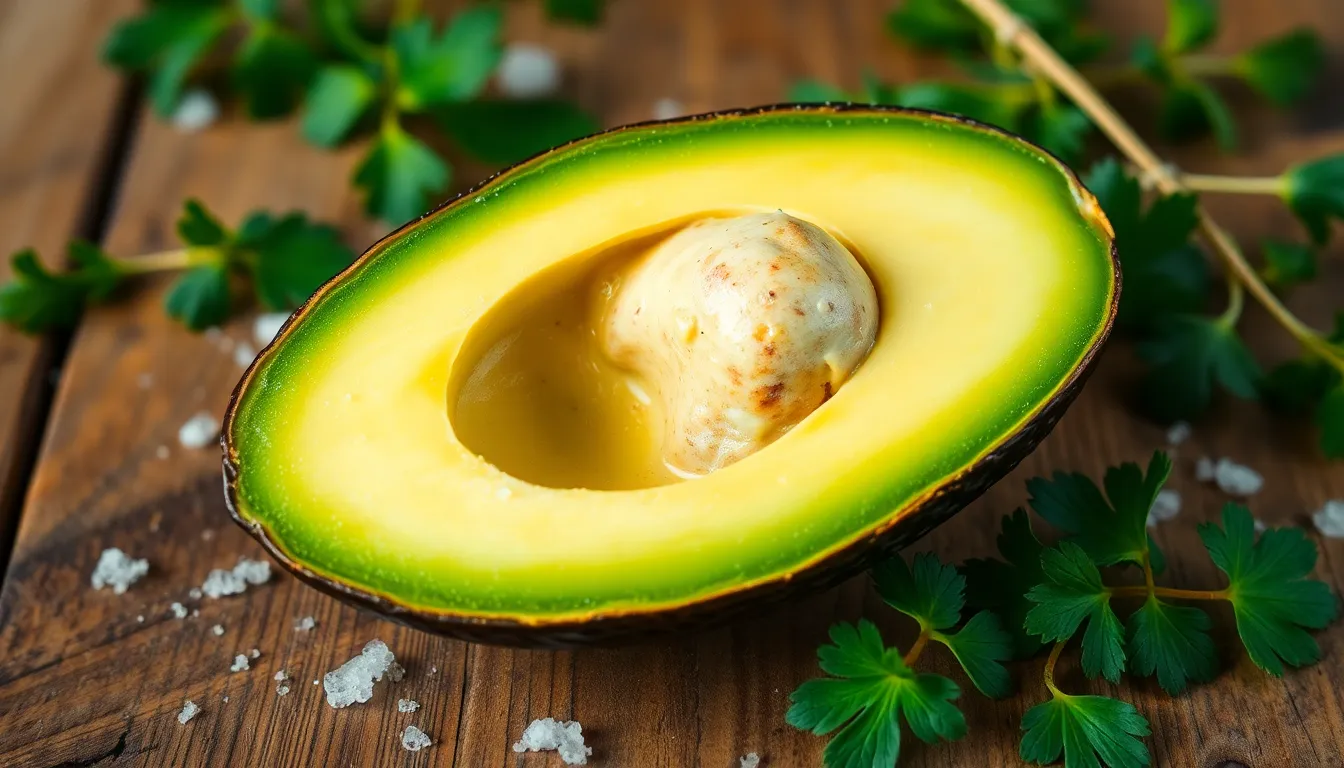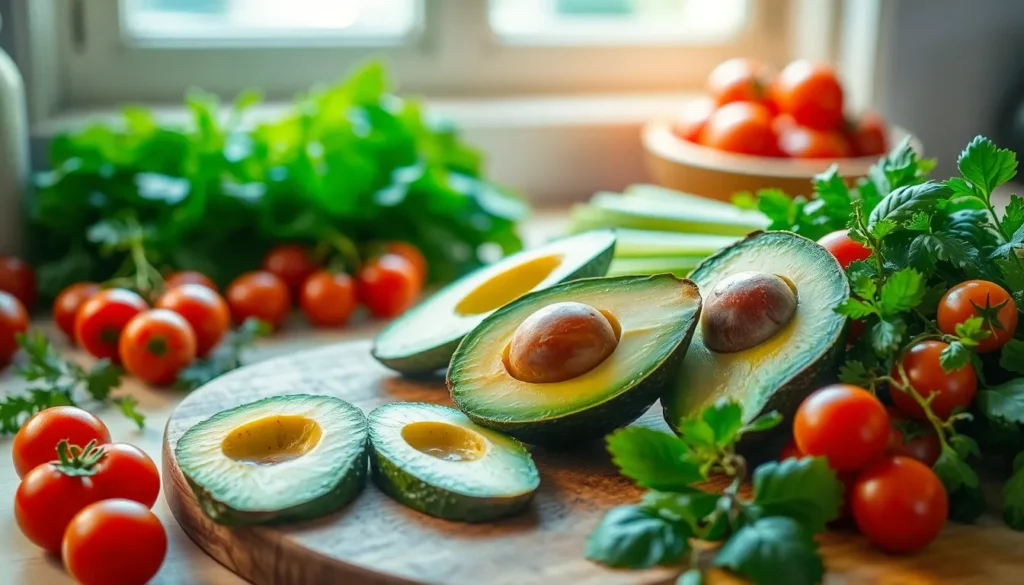Table of Contents
ToggleAvocados are the creamy green superstars of the food world, often hailed for their healthy fats and delicious flavor. But when it comes to protein, they might not be the first thing that pops into your mind. After all, who ever heard of guacamole being the secret to bulking up?
Is Avocado High In Protein?
Avocado contains approximately 2 grams of protein per 100 grams. This value is relatively low compared to sources like chicken breast, which delivers around 31 grams per 100 grams. Despite its lower protein content, avocado offers other significant nutritional benefits.
Healthy fats make up a substantial part of an avocado’s composition. About 15 grams of unsaturated fats contribute to heart health and overall nutrition. Vitamins C, E, and K along with vital minerals such as potassium also exist within the fruit. These components enhance its health profile, but they don’t bolster protein intake.
For individuals focusing on muscle building or protein-rich diets, avocado alone won’t suffice. A well-rounded diet needs diverse protein sources, such as legumes or dairy products, to meet protein goals effectively. Furthermore, including an array of protein sources ensures essential amino acid intake.
Avocados serve as nutritious additions to meals, offering creamy textures and satisfying flavors. They blend well in smoothies or salads, enhancing the overall nutrient density without significantly impacting protein levels. To maximize protein intake, pair avocado with protein-dense foods like eggs, beans, or chicken.
Understanding avocado’s nutritional contributions clarifies its role in a holistic diet. While avocados are not high in protein, they provide numerous health benefits that complement a balanced eating plan.
Nutritional Profile Of Avocado

Avocados are a nutritious addition to diets, providing essential fats and various vitamins and minerals. These characteristics contribute to their popularity among health-conscious individuals.
Macronutrients Breakdown
Avocados offer a macronutrient profile that’s primarily composed of healthy fats. Each 100 grams contains about 15 grams of unsaturated fats, crucial for heart health. Protein content remains low, with roughly 2 grams per 100 grams. Carbohydrates also play a role, delivering around 9 grams, of which only about 7 grams are fiber. Fiber aids digestive health and helps maintain fullness. Therefore, while the protein levels aren’t high, other macronutrients support a balanced approach to nutrition.
Vitamins And Minerals
Avocados are rich in vitamins and essential minerals, enhancing their nutritional value. Notably, each serving provides significant quantities of vitamins C, E, and K. Vitamin C supports immune function, while vitamin E acts as an antioxidant. Vitamin K plays a critical role in blood clotting. Furthermore, avocados are an excellent source of potassium, containing approximately 485 milligrams per 100 grams, which aids in regulating blood pressure. This combination of vitamins and minerals underscores avocados’ contribution to a healthy diet.
Protein Content Comparison
Comparing avocados to other protein sources reveals significant differences in protein content. Avocados contain about 2 grams of protein per 100 grams. Conversely, chicken breast offers approximately 31 grams of protein for the same weight. Greek yogurt also stands out with around 10 grams of protein per 100 grams. These figures illustrate that while avocados contribute to dietary protein, they lack sufficient protein content compared to traditional sources. Pairing avocados with these high-protein foods enhances overall protein intake while adding healthy fats.
Understanding protein quality involves evaluating the essential amino acids present in food. Complete proteins contain all nine essential amino acids, crucial for muscle repair and growth. Animal sources like eggs and fish provide complete proteins, while plant sources often contain incomplete proteins. Avocados, primarily composed of fats and carbohydrates, fall into the latter category. Consequently, they may not support individual protein needs as effectively as complete protein sources. Including a variety of proteins ensures a balanced diet and optimal muscle support.
Health Benefits Of Avocado
Avocados offer several health benefits, making them a valuable addition to a balanced diet.
Heart Health
Avocados contribute to heart health through their high content of monounsaturated fats, which help lower bad cholesterol levels. About 15 grams of these healthy fats per 100 grams promote cardiovascular well-being. Additionally, avocados contain potassium, with approximately 485 mg per fruit, which supports healthy blood pressure. Research indicates that diets rich in avocados can lower the risk of heart disease. With vitamins C and E present, avocados also contain antioxidants that fight inflammation, further benefiting cardiovascular health.
Weight Management
Avocados assist in weight management due to their fiber content, with around 7 grams per 100 grams. Fiber increases feelings of fullness, reducing overall calorie intake. Each serving’s healthy fats also promote satiety, ensuring people feel satisfied longer. Including avocados in meals can lead to healthier food choices, with studies showing a reduction in unhealthy snacks. Caloric density of avocados can help maintain energy balance when eaten in moderation. By incorporating these nutrient-dense fruits, individuals can support their weight management goals effectively.
Ways To Incorporate Avocado Into Your Diet
Incorporating avocados into daily meals provides nutritional enhancements alongside added flavor. They blend well into various recipes, making them versatile additions.
Recipes And Meal Ideas
Guacamole serves as a classic dip made from mashed avocados, lime juice, and spices. Sandwiches benefit from avocado slices that provide creaminess and healthy fats. Salads gain an upgrade with diced avocado mixed with greens, tomatoes, and onions. Smoothies become richer when blended with avocado, offering a creamy texture without overpowering flavors. Breakfast dishes such as avocado toast topped with poached eggs present a nutritious starting point for the day. Lastly, avocado-based sauces can enhance various dishes, from tacos to grilled meats.
Tips For Pairing With High-Protein Foods
Focusing on combinations boosts overall protein intake. Pairing avocados with eggs results in a breakfast option rich in protein and healthy fats. Incorporate black beans into avocado salads for added fiber and protein content. Topping whole grain toast with avocado and cottage cheese creates a filling snack or meal. Chicken breast adds lean protein when served alongside avocado salsa. Consider mussels or shrimp with avocado to create a seafood dish that’s delicious and nutritious. Lastly, incorporating avocado into smoothies with Greek yogurt maximizes both creaminess and protein quality.
Avocados may not be a protein powerhouse but they offer a wealth of health benefits that make them a valuable addition to any diet. Their healthy fats vitamins and minerals contribute to overall well-being and heart health. While it’s important to include a variety of protein sources for muscle building and repair avocados can complement those foods beautifully. By pairing them with high-protein options individuals can enjoy a balanced meal that satisfies both nutritional needs and taste preferences. Incorporating avocados into daily meals not only enhances flavor but also supports a healthy lifestyle.





